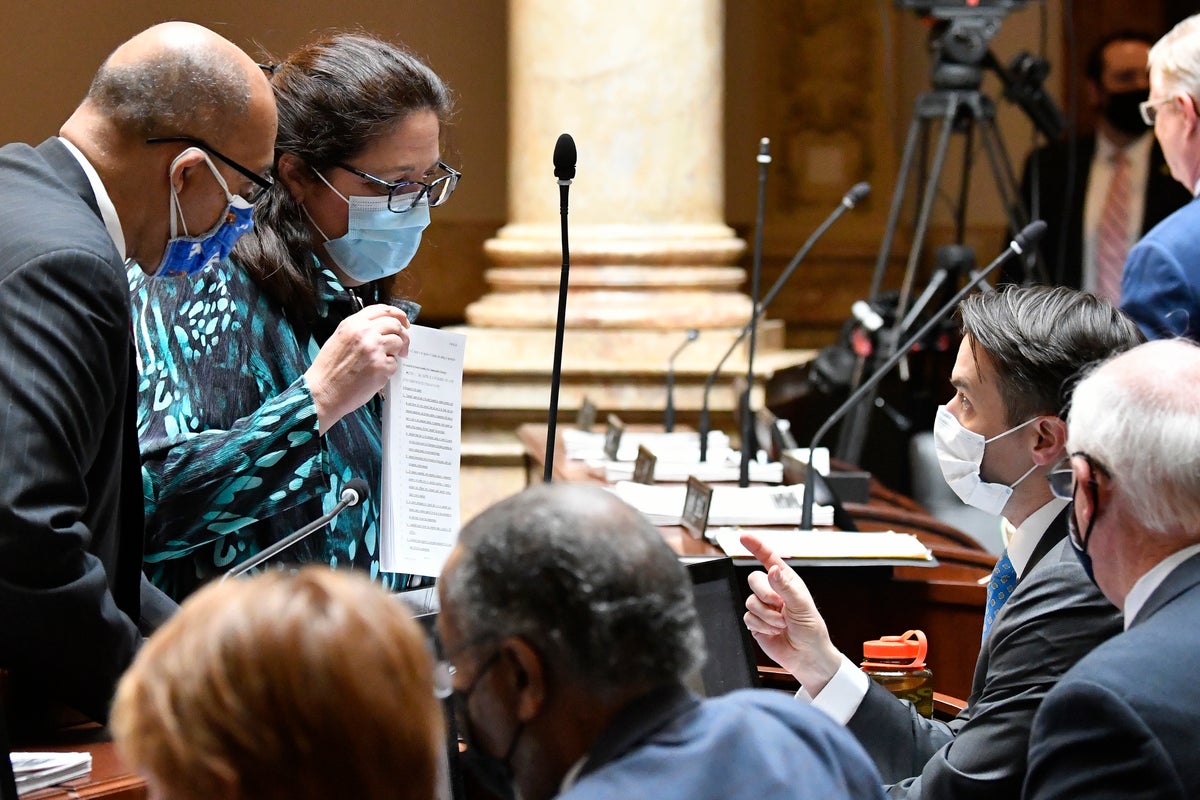
Republican lawmakers in Kentucky advanced a bill Thursday to allow teachers to misgender their transgender students, plunging into a culture war issue despite pleas to resist doing so from a Senate colleague whose transgender son died recently.
The GOP-dominated Senate Education Committee heard impassioned pleas from transgender advocates warning that the measure would put transgender youths at greater risk of harm. The bill won overwhelming approval from the committee to advance to the full Senate.
Democratic Sen. Karen Berg watched from the audience, saying later that she wanted her colleagues to "have to make that vote in front of me.” Berg's son, Henry Berg-Brousseau, was a transgender rights advocate who died late last year at age 24. The cause was suicide, his mother said.
“I was praying that my colleagues would have enough respect for me not, at least, to do it in the Senate,” Berg said later in an interview. “To let them do it in the House and say: ‘This session we won’t bring it here.' But clearly I was wrong.”
The measure won committee approval a day after being introduced by Republican Sen. Max Wise, the running mate for GOP gubernatorial Kelly Craft. Craft, a former U.S. ambassador to the United Nations, is among a dozen Republicans seeking their party’s nomination in Kentucky’s May primary. Democratic Gov. Andy Beshear is seeking a second term in the GOP-trending Bluegrass State.
In a Senate floor speech promoting his new bill on Wednesday, Wise said: “School administrators and faculty are being unnecessarily pressured to conform to an agenda that has no place within our public schools. It’s time to remove these unnecessary distractions from our classrooms."
Berg spoke next, urging her colleagues to "avoid politicizing issues that are literally killing our children.”
Craft has railed against the state's education department in campaign speeches, accusing top education leaders of “pushing woke agendas in our schools.”
Wise said Thursday that his bill would enhance communication between schools and parents regarding health services and school curriculum around sexuality.
The measure would prohibit education leaders from requiring policies to keep students’ information confidential from their parents, he said. Schools could choose to withhold the information if, based on past conduct, they believe the information would lead to parental abuse.
Another key provision in the bill would prevent policies compelling school staff to use pronouns that don't conform to a student's biological sex.
“The bill does not prevent students from requesting identification by a non-birth-conforming pronoun, nor prevent staff and students from addressing those students with non-conforming pronouns,” Wise told the committee.
Transgender advocates pushed back, saying the bill would hurt transgender youths.
“I was ‘out’ at school because it was so nice to have one place where I could just be myself and have people call me the right name," Mason Chernosky, a transgender man, said in recalling his own youth. “However, I was terrified that someone at my school was going to tell my parents.”
If that had happened, "everything was going to get so much worse for me,” Chernosky said.
While his friends benefited from mental health support, he didn't seek out the assistance out of fear that school officials would tell his parents, Chernosky said.
“That’s why I think this bill would be dangerous for the mental health of children across Kentucky,” he said. “I was one of those children whose mental health would have been harmed by this bill.”
The bill would require that parents get two weeks’ notice and an opportunity to review materials before human sexuality instruction begins at their children's school. An alternate assignment would have to be made available for students whose parents disapprove of the instruction.
“These are all topics and discussions that parents need to be aware of always in the upbringing of their children,” Wise said.
The measure advances to the full Senate next and would still need House approval if it clears the Senate. Both chambers have Republican supermajorities.
Berg said she sees political motivations driving the bill, coming amid the gubernatorial campaign.
“I see it as a cheap way to build a base — just to say, ‘I’m stopping the wokeness.’ What is that?” she said.
Asked about the issue on Thursday, Beshear said he was “struck by the callousness” of the bill, coming less than two months since the death of Berg's son. The governor also expressed concerns that the measure would lead to increased bullying in schools,
“School’s hard and bullying is real," Beshear said at his weekly news conference. "We ought to be really thoughtful that we don’t do things that subject our kids – anybody’s kids, no matter who they are -- to more bullying.”







